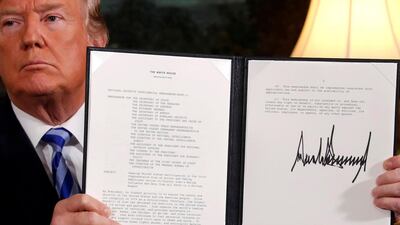The US and Iran will face off at the UN's highest court on Monday in the latest round of a fight over sanctions on Tehran reimposed by President Donald Trump.
Iran took the US to the International Court of Justice in The Hague in 2018 after Mr Trump pulled the US out of a 2015 international nuclear deal between Tehran and world powers.
They will debate in the coming week about whether the court, set up after the Second World War to deal with disputes between UN member states, has jurisdiction in the case.
Iran said the sanctions reimposed by the Trump administration after it withdrew from the agreement breached the 1955 Treaty of Amity between the two countries, signed long before they severed ties after the 1979 Iranian revolution.
Iran had a victory in October 2018, when the ICJ ordered sanctions on humanitarian goods must be eased as an emergency measure while the overall lawsuit was dealt with.
The US responded by formally ending the treaty, agreed on when Iran was ruled by the western-oriented shah, and accusing Iran of using the ICJ for propaganda.
The US will first address the court on Monday at 1pm GMT about whether judges have jurisdiction, while Iran will speak on Wednesday.
A decision on that issue could take several months, while a final judgment will take years.
Relations between Washington and Tehran have been tense since the Iranian revolution, and have dropped further since the US left the nuclear accord in May 2018.
The deal, involving the five permanent members of the UN Security Council – Britain, China, France, Russia and the US, plus Germany – had limited Iran's nuclear programme.
Washington's reimposed sanctions on Tehran and companies with ties to it hit Iran's oil sector and central bank hard.
The court in 2018 ordered the US to lift sanctions on medicine, medical equipment, food, agricultural goods, and aircraft parts and services.
The ICJ is also dealing with a separate case over Tehran's bid to unfreeze $2 billion (Dh7.34bn) in assets in the US.
In February 2019 the court said the case could go ahead, rejecting US arguments that Iran's "unclean hands" – Tehran's backing for terrorist groups – should disqualify its lawsuit.
The court case begins a day after the head of Iran's atomic agency, Ali Akbar Salehi, said that 1,044 centrifuges were active at the Fordow uranium enrichment plant, as it reduced its commitments to the nuclear deal.
The suspension of all enrichment at the underground plant near the city of Qom was one of the restrictions on Iran's nuclear activities that it accepted in return for the lifting of international sanctions in the 2015 accord.
Tehran first announced the resumption of enrichment at Fordow in northern Iran last November, in the fourth phase of its push since May 2019 to progressively suspend commitments to the deal.

